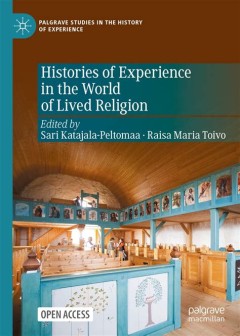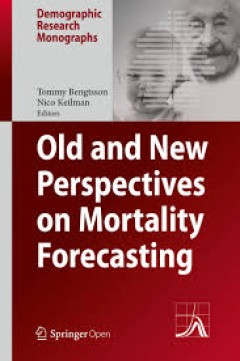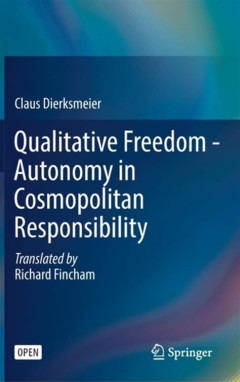Filter by

Exceptional Lifespans
How long can humans live? This open access book documents, verifies and brings to life the advance of the frontier of human survival. It carefully validates data on supercentenarians, aged 110+, and semi-supercentenarians, aged 105-109, stored in the International Database on Longevity (IDL). The chapters in this book contribute substantial advances in rigorously checked facts about exceptional…
- Edition
- -
- ISBN/ISSN
- 9783030499709
- Collation
- VII, 344
- Series Title
- -
- Call Number
- -

Histories of Experience in the World of Lived Religion
'At a historic moment, when religion shows all its social and political strength in various post-modern societies around our globe, this fascinating collection of studies from the Middle Ages to twentieth-century Europe demonstrates all the richness and innovative force of investigating individual and shared experiences when questioning the cultural, political and social place of religion in so…
- Edition
- 1
- ISBN/ISSN
- 9783030921408
- Collation
- XIII, 305 hlm,: ill, lamp;
- Series Title
- -
- Call Number
- -

Lived Nation as the History of Experiences and Emotions in Finland, 1800-2000
This open access book uses Finland in the nineteenth and twentieth centuries as an empirical case in order to study the emergence, shaping and renewal of a nation through histories of experience and emotions. It revolves around the following questions: What kinds of experiences have engendered national mobilization and feelings of national belonging? How have political and societal conflicts tu…
- Edition
- 1
- ISBN/ISSN
- 9783030698829
- Collation
- XXI, 392 hlm,: ill, lamp;
- Series Title
- -
- Call Number
- -

Old and New Perspectives on Mortality Forecasting
This open access book describes methods of mortality forecasting and discusses possible improvements. It contains a selection of previously unpublished and published papers, which together provide a state-of-the-art overview of statistical approaches as well as behavioural and biological perspectives. The different parts of the book provide discussions of current practice, probabilistic forec…
- Edition
- -
- ISBN/ISSN
- 9783030050757
- Collation
- XI, 349
- Series Title
- -
- Call Number
- -

Childlessness in Europe: Contexts, Causes, and Consequences
This open access book provides an overview of childlessness throughout Europe. It offers a collection of papers written by leading demographers and sociologists that examine contexts, causes, and consequences of childlessness in countries throughout the region.The book features data from all over Europe. It specifically highlights patterns of childlessness in Germany, France, the United Kingdom…
- Edition
- -
- ISBN/ISSN
- 9783319446677
- Collation
- XI, 370
- Series Title
- -
- Call Number
- -

Qualitative Freedom - Autonomy in Cosmopolitan Responsibility
In the light of growing political and religious fundamentalism, this open access book defends the idea of freedom as paramount for the attempt to find common ethical ground in the age of globality. The book sets out to examine as yet unexhausted ways to boost the resilience of the principle of liberalism. Critically reviewing the last 200 years of the philosophy of freedom, it revises the princ…
- Edition
- 1
- ISBN/ISSN
- 9783030047238
- Collation
- X, 365 hlm,: ill, lamp;
- Series Title
- -
- Call Number
- -

Agricultural Implications of the Fukushima Nuclear Accident (III)
This open access book presents the findings from on-site research into radioactive cesium contamination in various agricultural systems affected by the Fukushima Daiichi Nuclear Power Plant accident in March 2011. This third volume in the series reports on studies undertaken at contaminated sites such as farmland, forests, and marine and freshwater environments, with a particular focus on lives…
- Edition
- -
- ISBN/ISSN
- 9789811332180
- Collation
- XI, 248hlm,: ill, lamp;
- Series Title
- -
- Call Number
- -

Der junge Carnap in historischem Kontext: 1918–1935 / Young Carnap in an Hi…
This open access volume is based on the 'Early Carnap in Context’ workshop that took place in Konstanz in 2017 and looks at Rudolf Carnap’s philosophy, documented in his recently released diaries, from a combination of historical, cultural and philosophical perspectives. It enables further evaluation of the diaries and traces newly found interrelationships and their systematic definition. F…
- Edition
- -
- ISBN/ISSN
- 978-3-030-58251-7
- Collation
- XIV, 264
- Series Title
- -
- Call Number
- -

Handbook of Military Sciences
This open access handbook is a major reference work in the field of Military Sciences. Its main purpose is to inform and enlighten those dealing with the military on the role and contributions of science in describing, understanding and explaining military life, knowledge and doings. The handbook provides a comprehensive thematic introduction to various sub-fields of Military Sciences. The …
- Edition
- 1
- ISBN/ISSN
- 9783030028664
- Collation
- -
- Series Title
- -
- Call Number
- -

Animals in Our Midst: The Challenges of Co-existing with Animals in the Anthr…
This Open Access book brings together authoritative voices in animal and environmental ethics, who address the many different facets of changing human-animal relationships in the Anthropocene. As we are living in complex times, the issue of how to establish meaningful relationships with other animals under Anthropocene conditions needs to be approached from a multitude of angles. This book offe…
- Edition
- -
- ISBN/ISSN
- 978-3-030-63523-7
- Collation
- XV, 579
- Series Title
- -
- Call Number
- -
 Computer Science, Information & General Works
Computer Science, Information & General Works  Philosophy & Psychology
Philosophy & Psychology  Religion
Religion  Social Sciences
Social Sciences  Language
Language  Pure Science
Pure Science  Applied Sciences
Applied Sciences  Art & Recreation
Art & Recreation  Literature
Literature  History & Geography
History & Geography